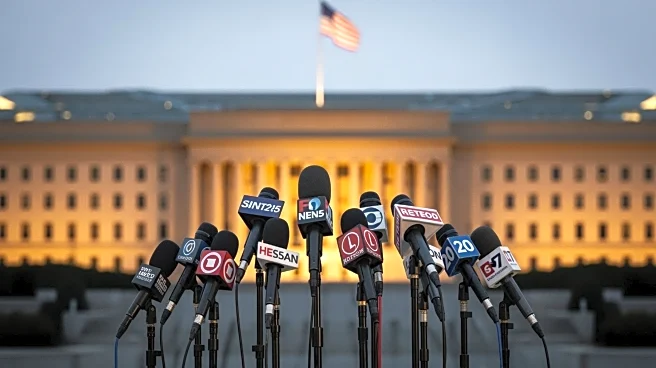What's Happening?
Several major US news organizations, including The New York Times, The Washington Post, and CNN, have refused to comply with new Pentagon guidelines that require military personnel's approval for media
access to information. The guidelines mandate that information must be approved for public release by an appropriate official before it can be shared with the media, even if it's unclassified. This has led to prominent media organizations turning in their press credentials and vowing to continue reporting from outside the Pentagon. The Associated Press, Reuters, The Wall Street Journal, and NPR are among the other media entities that have refused to sign the new guidelines. The major TV networks, including ABC News, CBS News, and NBC News, have also expressed concerns that the rules would hinder their ability to inform the public about national security issues.
Why It's Important?
The refusal of major news outlets to sign the Pentagon's new guidelines highlights significant concerns over press freedom and transparency in reporting on national security issues. The guidelines are seen as a potential threat to the First Amendment rights of journalists, as they could limit the ability of the press to report on military affairs without prior approval. This move could impact public access to information about the US military and its operations, potentially leading to less informed public discourse. The decision by these media organizations to reject the guidelines underscores the importance of maintaining independent journalism and the free flow of information in a democratic society.
What's Next?
As the deadline for signing the new guidelines approaches, journalists who refuse to comply will be required to turn in their press credentials and vacate Pentagon facilities. This could lead to a shift in how military affairs are covered, with reporters relying more on external sources and potentially facing challenges in accessing timely and accurate information. The Pentagon's stance may also prompt legal challenges or further negotiations between media organizations and the Department of Defense to find a compromise that respects both national security and press freedom.
Beyond the Headlines
The new Pentagon policy could have long-term implications for the relationship between the military and the media. By restricting access, the Pentagon may inadvertently create a more adversarial environment, where journalists are forced to seek information through alternative means, potentially leading to less accurate reporting. Additionally, the policy raises ethical questions about the balance between national security and the public's right to know, as well as the role of the press in holding government institutions accountable.









